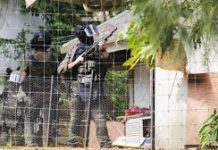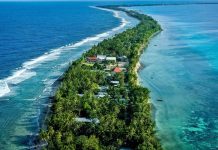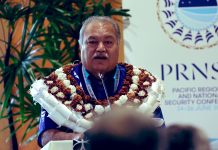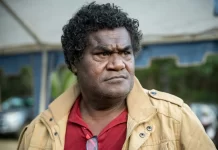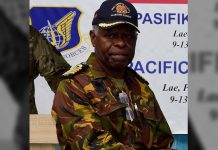The United States will have an expanded right to board vessels in Samoa’s waters under an amended maritime law enforcement agreement that could boost the effectiveness of patrols by a Coast Guard ship recently deployed to the Pacific.
The updated shiprider pact signed Friday shows the U.S is “committed to safeguarding and ensuring security of Samoa’s economic exclusive zone,” its embassy in Samoa’s capital Apia said in a statement.
The new agreement means the Coast Guard can board and inspect vessels in Samoa’s waters if requested without a Samoan law enforcement officer present. It adds to similarly enhanced shiprider agreements with Palau, Federated States of Micronesia and Papua New Guinea signed over the past two years.
The medium-endurance U.S Coast Guard Cutter Harriet Lane has been reassigned to the Pacific since December as part of U.S commitments to deepen relations with a region where China has made inroads with island nations. Based at Pearl Harbour, the cutter’s inaugural three-month patrol that began in January has taken it to countries such as Papua New Guinea, Fiji, Samoa and Vanuatu.
Beijing’s influence in the Pacific has increased over the past two decades through a combination of trade, infrastructure and aid as it seeks to isolate Taiwan diplomatically, gain allies in international institutions and advance its economic and security interests.
Many Pacific island countries rely on help from Australia, New Zealand and the U.S to police their vast exclusive economic zones, which extend 200 nautical miles from land, to deter illegal fishing and counter the illicit narcotics trade.
The U.S has shiprider agreements with 12 Pacific island nations, but until Harriet Lane’s redeployment didn’t have a cutter based in Honolulu or Guam that could carry out longer range operations in the South Pacific.
The expanded agreements mean coast guard vessels can conduct law enforcement the entire time they’re in an island country’s waters, not only when an official from the host country is on board.
According to the U.S embassy in Apia, the arrangements have increased the number of ship boardings and resulted in greater deterrence of illegal activity, the Samoa Observer newspaper reported Friday.
Harriet Lane’s Commander Nicole Tesoniero told BenarNews in late March the patrol had already carried out 28 vessel boardings under shiprider agreements with Pacific island countries – equal to more than a third of the boardings carried out in a year by the six fast-response Coast Guard cutters based in Hawaii and Guam.
The English-language news website of China’s armed forces has described the shiprider agreements as allowing the U.S to interfere in the Pacific under the pretext of helping island nations.
It says the U.S Coast Guard operations have a “strong military vibe” and some countries are reluctant to be involved with them.
China’s Coast Guard is regularly involved in clashes with vessels from Southeast Asian nations such as the Philippines as Beijing seeks to impose control over the South China Sea where territorial claims overlap.
The expanded shiprider agreement signed with Palau last year followed a series of unexplained visits to the Micronesian country’s exclusive economic zone by Chinese research vessels.
Under international law, nations have exclusive rights to economic exploitation of the 200 nautical mile zone around their land borders. The seas beyond a 12 nautical mile territorial zone are international waters so foreign vessels can travel through them.







